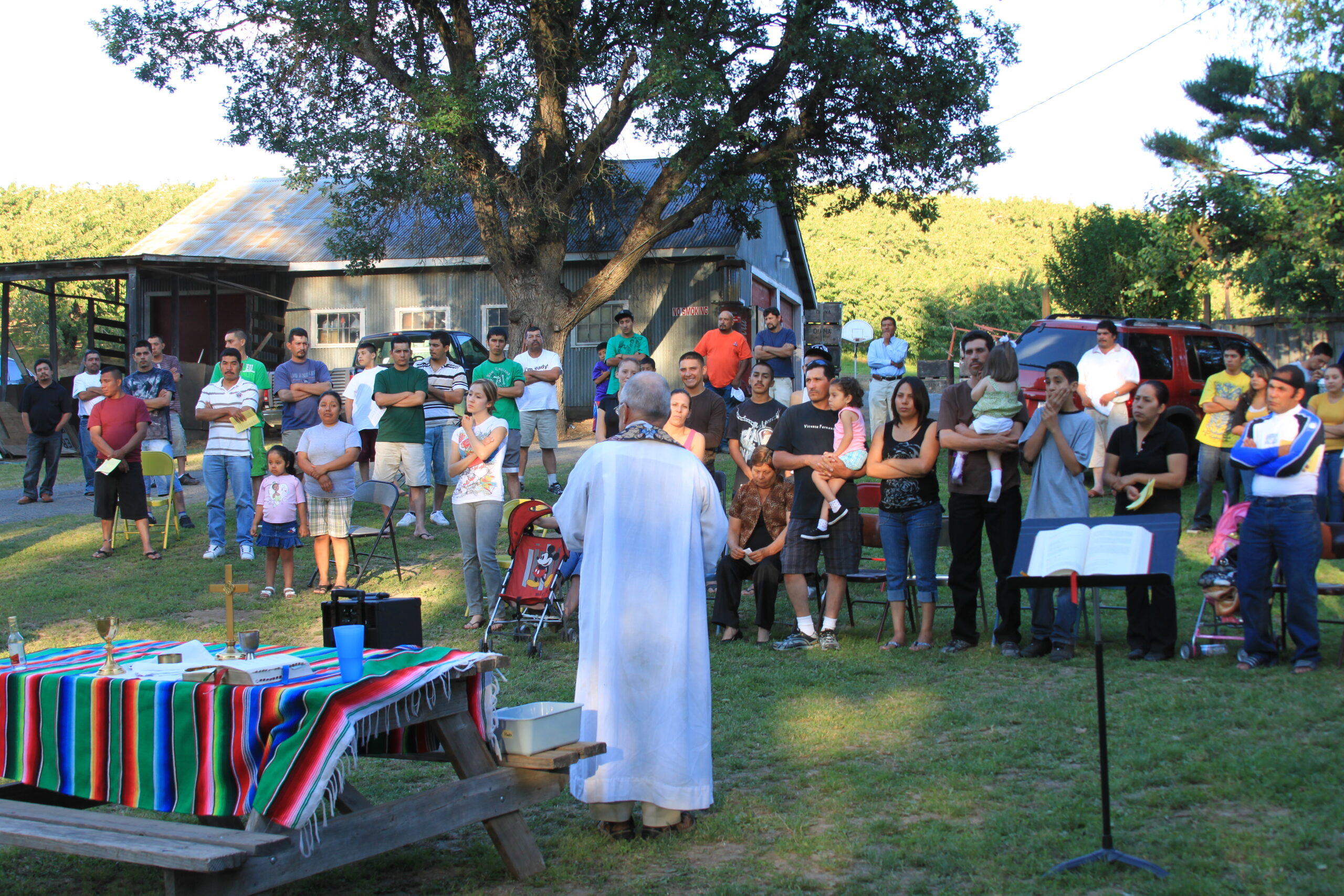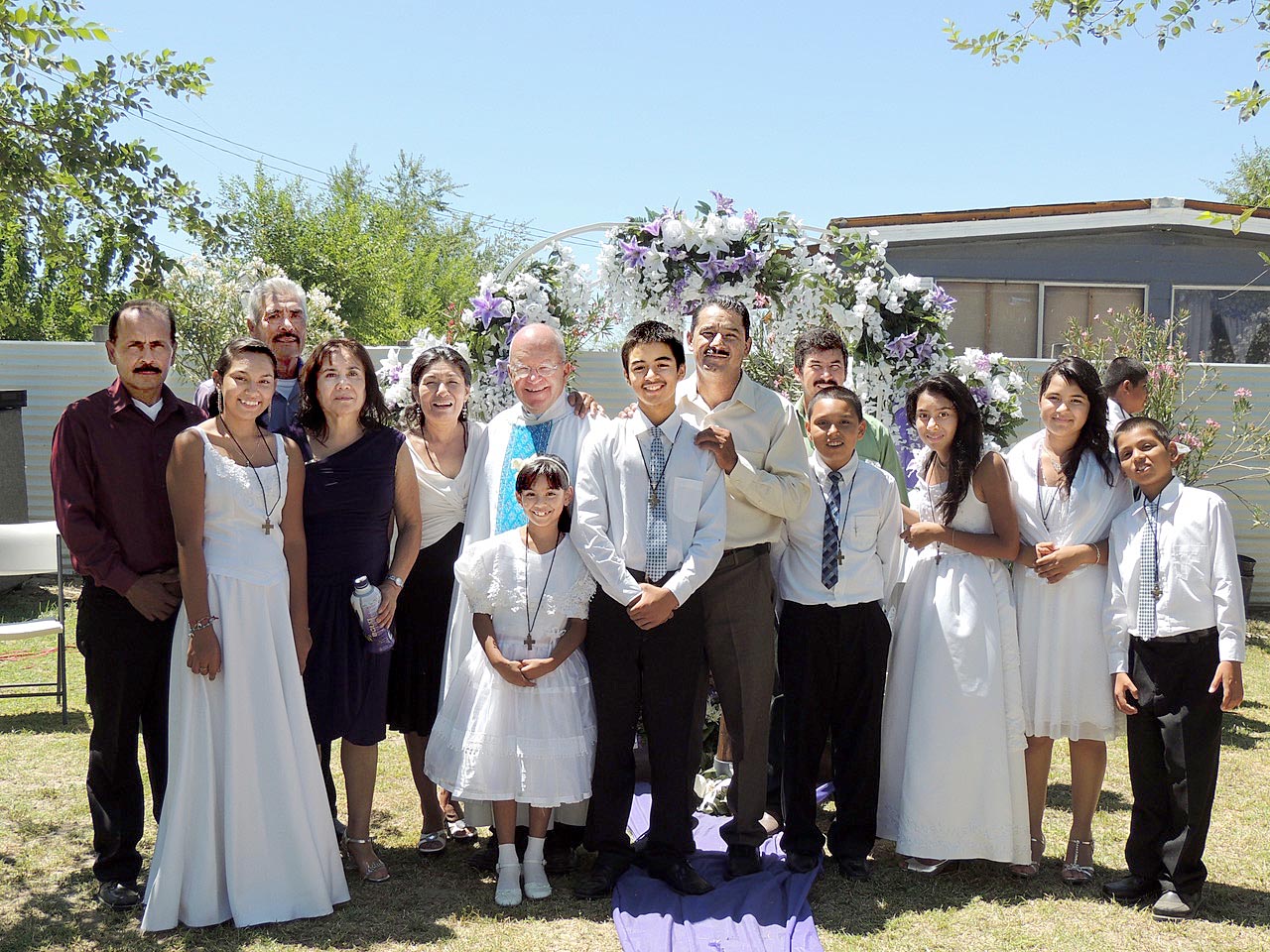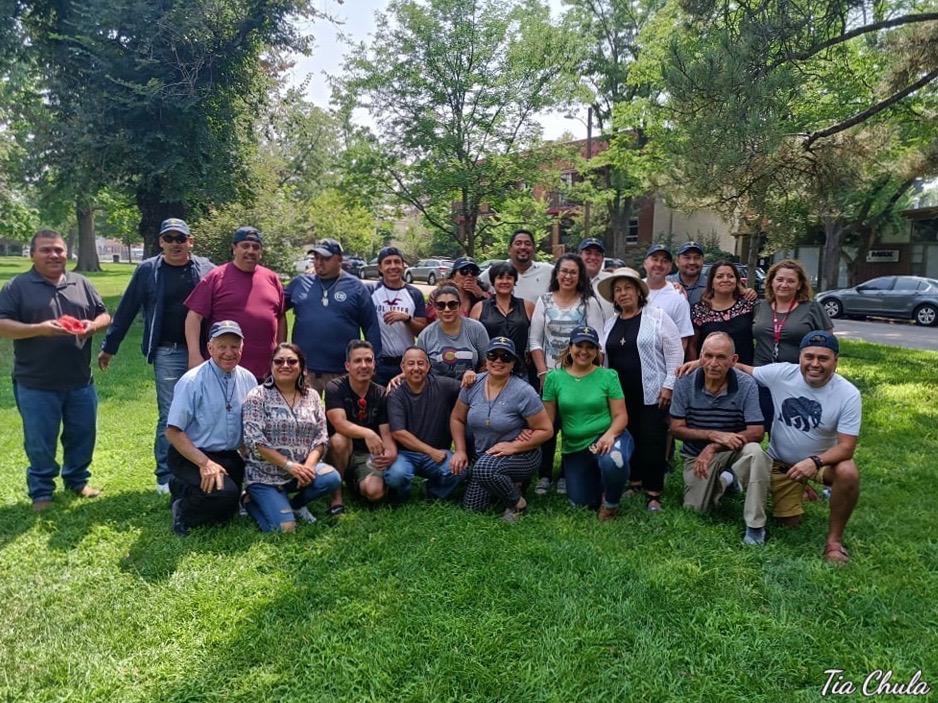Mission Stories: Reflexiones después de mi año sabático – Reflections after my sabbatical
Una recomendación para los suscriptores que reciben estas publicaciones diariamente: Cuando abra la publicación, presione el título del artículo en verde para revisarlo en el sitio web. Hay una mejor distinción entre español e inglés. Además, lo invita a ver más del sitio y le da acceso a publicaciones anteriores.
A recommendation for subscribers who receive these posts daily: When you open the post, push the title of the article in green to review it on the website. There is a better distinction between Spanish and English. Also, it invites you to see more of the site and gives access to previous posts.
Reflexiones después de mi año sabático
Mi año sabático en 2007 fue una de las mejores experiencias que he tenido como misionero redentorista. Espero que más personas lleguen a apreciar el trabajo y la vida de las personas que están detrás de la abundancia de alimentos producidos en nuestro país. El blog de hoy es la conclusión del capítulo 3 de La Fe del Migrante:
La variedad de trabajo que hacen los trabajadores migrantes
Después de una cosecha, los trabajadores usualmente viajan con otros miembros de la familia encaminándose en distintas direcciones para el siguiente trabajo. Unos se van de The Dalles, Oregón para pizcar cerezas en Washington o Montana mientras que otros se van a California para las cosechas del durazno y la ciruela. Otros siguen las cosechas de la pera, nuez, cebolla, tomate, mora, uva y otras frutas y verduras. Cada cosecha requiere distintas habilidades. Las condiciones de vivienda varían de un lugar a otro.
Los campesinos temporales toman un día o dos para acostumbrarse a la rutina de trabajo en un lugar nuevo. Llegan a conocer el trabajo y el lugar de trabajo. Se acostumbran a una rutina que incluye estar al pendiente de las necesidades de la vida. A veces el trabajo es cansado físicamente por el peso del producto, tal como las peras y las manzanas. A veces el trabajo es difícil porque tienen que agacharse y trabajar la tierra. A veces la fruta los incomoda por los irritantes que contiene, como la pelusa del durazno. Otras veces, por ejemplo, en un vivero, algunas tareas cansan mentalmente pues la persona tiene que contar las plantas que cosecha. Es mentalmente desafiante cuando la cuenta de las plantas llega a los miles.
Los trabajadores migrantes viven al momento. Sus vidas son móviles al ir de un trabajo a otro. Siempre están trabajando, pero nunca están estables en su empleo. El contacto con la familia sufre por la distancia y los largos periodos de ausencia. Su práctica religiosa es privada. Cuando asisten a misa, se sienten fuera de lugar y rechazados por su asistencia irregular. Escuchan una falta de respeto y voces de odio a través de los medios de comunicación y pueden perder el sentido de su dignidad humana.
En lo más profundo de su ser, los trabajadores migrantes saben que ponen comida en las mesas de toda la gente del mundo. Es un trabajo duro que se hace en condiciones muy incomodas. Los trabajadores migrantes merecen nuestro respeto. Seguido invito a la gente a rezar por nuestros trabajadores de la cosecha. Lo hago con gran respeto y amor por quienes traen la comida a nuestras mesas.
Los trabajadores migrantes son gente de esperanza
Cuando les preguntan por que trabajan en el campo, los que son padres dicen que trabajan para darles esperanza y oportunidad a sus hijos. Los solteros dicen que trabajan para ayudar a sus padres en California o en México. A veces, los padres se preguntan si vale la pena emigrar a los Estados Unidos. Temen la pérdida de los valores tradicionales del trabajo, la honestidad, la fe y la familia. Se preocupan por la atracción de las drogas y la fascinación de sus hijos por lujos que descubren en los Estados Unidos. La mayoría de los trabajadores viene de zonas rurales de México, tienen poca educación formal y tienen pocas opciones de otros tipos de trabajo. Muchos jóvenes y niños viven en situaciones que los privan de oportunidades educativas de calidad. A menudo, se mudan con sus padres de cosecha a cosecha. En las misas en los campos de trabajo, seguido era difícil encontrar a alguien para leer. Parecía que muchos adultos no podían leer.
Hay muchos hombres que vienen de México y pasan algunos meses cada año siguiendo las distintas cosechas. Los que tienen documentos regresan a visitar a sus familias en México una o dos veces al año. Estos migrantes sienten la soledad de la separación de sus cónyuges e hijos, pero creen que es mejor que sus hijos crezcan en su país natal.
Hay mucha gente joven en los campos de trabajo. Unos están con sus familias y trabajan para ayudar a la familia. Los que han asistido a la escuela en los Estados Unidos se refieren al trabajo como trabajo de verano antes de regresar a la preparatoria o al colegio. Muchos de los jóvenes han venido de México para vivir con hermanos o hermanas mayores o con parientes o amigos de su pueblo natal. Unos cuentan con el consejo y apoyo de sus hermanos o hermanas mayores y de sus tíos, pero otros viven en grupos con amigos. Ellos dicen que están aquí por la crisis económica de México. Muchos envían dinero para ayudar a sus familias. Algunos vienen por la aventura y con la esperanza de encontrar una vida mejor en los Estados Unidos.
No hay mucho que hacer en los campos después del trabajo. Muchos de los jóvenes caminan al pueblo al anochecer. Van a jugar fútbol o baloncesto o a buscar un lugar donde pasar el rato. En su soledad y enfado, muchos buscan el consuelo del alcohol. El alcohol es una preocupación seria pues obviamente está presente en los campos de trabajo. La mayoría se acuesta temprano por el cansancio y para estar listos para el siguiente día de trabajo.
En cada campo hay jóvenes con grandes aspiraciones y esperanza. Enfrentan dificultades para lograr sus metas, pero desean aprender inglés y educarse. Los alumnos buenos pueden enfrentar discriminación de parte de sus compañeros o burlas por intentar salir adelante. Hay poco tiempo para estudiar y es difícil encontrar el silencio necesario para estudiar en los campos de trabajo. En cada campo hay jóvenes con esperanzas y sueños dispuestos a hacer lo que sea necesario para lograr sus sueños.
Deseando y recibiendo respeto
Al final del día, los trabajadores están cansados, pero sienten una alegría especial al ver los resultados de su trabajo. La cercanía a la naturaleza y el compañerismo une a la gente. Los trabajadores hablan con orgullo de llevar la comida a las mesas del mundo. Hay un aprecio genuino de parte de los rancheros que tratan a los trabajadores con respeto y dignidad. La mayoría de los dueños de las huertas muestran un interés real en sus empleados. El jefe abusivo es una vergüenza para otros jefes que si son buenas personas.
Aún así, muchos trabajadores no se sienten respetados. Algunos comentan sobre el trato grosero en las tiendas locales. Están contentos de que más tiendas proveen productos mexicanos, pero sienten que siempre los están vigilando y no les tienen confianza. Estos sentimientos de falta de respeto no se aplican a una comunidad local en particular, sino a lo que experimentan los trabajadores en muchos pueblos. Hay tristeza por el trato de los trabajadores migrantes en los Estados Unidos. Un trabajador dijo: “Padre, mi familia se ha dedicado al trabajo del campo en este país por más de cincuenta años. Me gustaría que más gente lo apreciara”.
Reflections after my sabbatical
My sabbatical in 2007 was one of the greatest experiences that I have had as a Redemptorist missionary. I hope that more people come to appreciate the work and lives of people behind the bounty of food produced in our country. Today’s blog is the conclusion of chapter 3 from Migrant Faith:
Variety of work done by migrant workers
After a harvest, workers often travel with other family members heading in several different directions for the next job. Some leave The Dalles, Oregon to pick cherries in Washington or Montana while others go to California for peach and plum harvests. Others go for harvests of pears, nuts, onions, tomatoes, berries, grapes, and other vegetables and fruit. Each harvest demands different skills. The living conditions vary from one place to another.
Temporary farm workers take a day or two to get into the routine of work in a new place. They get to know the work and the workplace. Their attention is to setting a routine that includes taking care of the necessities of life. Sometimes the work is more physically exhausting with the heavy weight of the crops, such as pears and apples. Sometimes the work is difficult because of having to bend down and working the soil. Sometimes the crop is uncomfortable because of dealing with irritants like peach fuzz. Some tasks are more mentally exhausting as the people must count the plants they harvest at a nursery. It is mentally challenging when the counting of plants goes into the thousands.
Migrant workers live in the moment. Their lives are mobile as they go from one job to another. They are always working, but never stable in their employment. The contact with family is strained by distance and long periods of absence. Their religious practice is private. When they do attend Mass, they often feel out of place and rebuked for their irregular attendance. They hear lack of respect from the voices of hate in the media and can lose a sense of their human dignity.
Deep down, migrant workers know that they put food on the tables of people all around the world. It is hard work, often done in very uncomfortable conditions. Migrant workers deserve our respect. I regularly invite people to pray for our harvest workers. I do so now with a tremendous respect and love for those who bring food to our tables.
Migrant workers are people of hope
When asked why they do migrant work, those who are parents say that they work to give hope and opportunity to their children. The unmarried say they work to help their parents in California or Mexico. At times, parents wonder if emigration to the United States is worthwhile. They fear the loss of traditional values of work, honesty, faith and family. They worry about the lure of drugs and the fascination of the children for luxuries discovered in the United States. Most of the workers come from rural areas of Mexico, have very little formal education and have few options for other types of work. Many young people and children live in situations that deprive them of quality educational opportunities. Often, they move with their parents from harvest to harvest. At masses in labor camps, it was often difficult to find someone to read. It appeared that many adults could not read.
There are many men who come from Mexico and spend several months each year following different harvests. The ones with documents return to their families in Mexico once or twice a year. These migrants experience the loneliness of separation from their wives and children, yet they believe it is better that their children grow up in their homeland.
There are many young men in the camps. Some are with their families and work to help the family. The ones who have attended school in the United States talk about the work as a summer job before going back to high school or college. Many of the young men have come here from Mexico to live with older brothers and sisters or relatives or friends from their hometown. Some have the guidance and support of older siblings and uncles, but others live in groups with friends. They say that they are here because of the economic crisis in Mexico. Many send money home to help their families. Some come for the adventure and the hope to find a better life in the United States.
There is not a lot to do in the camps after work. Many of the young men walk into town in the evening. They go to play soccer, or basketball, or to find a place to hang out. In their loneliness and boredom many seek the comfort of alcohol. Alcohol is a serious concern as it is so obviously present in the camps. Most go to bed early because of tiredness and to be ready for the next day’s work.
In every camp there are young people with grand aspirations and hope. They face difficulties reaching their goals, but they seek to learn English and get an education. The good students may face discrimination by their peers or may be laughed at for trying to get ahead. There is little time free for studies, and it is hard to find the quiet needed for study in the camps. In each camp there are young people with hopes and dreams and a willingness to do whatever is necessary to follow their dreams.
Wanting and Receiving Respect
At the end of the day, all are tired, but life has a special joy as workers see the results of their work. Closeness to nature and the camaraderie of the camp unites people. Workers speak with pride of putting food on the tables of the world. There is genuine appreciation of owners who treat them with respect and dignity. Many orchard owners show genuine interest in their employees. The abusive employer is an embarrassment to the good orchard owners.
Still, many workers do not feel respected. Several speak of being treated rudely in local stores. They are happy that more of the stores provide Mexican foods than in the past, yet they often believe that they are watched and not trusted. The feelings of lack of respect do not apply to one local community but to a general experience in many towns. There is sadness about the treatment of migrant workers in the U.S. One man said, “Padre, my family has been doing migrant farm work in this country for over fifty years. I just wish more people appreciated it.”
Sign up here to receive Padre Migrante blog posts via email.
“Sign up here to receive Padre Migrante blog posts via email.
Oh Jesús, tú nos llamas: “Síganme”. Bendice, Señor, a todos los que acogen tu llamado. Puede que el camino no sea fácil, pero tenemos la confianza de que todo es posible si caminamos contigo. Que este viaje nos abra los ojos a las maravillas de tu amor por nosotros. Oramos por toda tu gente, por todos los creyentes e incrédulos, por los líderes y seguidores. Oramos por la sanación, el perdón, la compasión, la justicia y la paz. Oramos para que, al seguirte, nosotros también podamos ser pescadores de hombres. Bendícenos en nuestro viaje.
O Jesus, you call us, “Come after me.” Bless, O Lord, all who welcome your call. The path may not be easy, but we have confidence that all things are possible if we walk with you. May this journey, open our eyes to the wonders of your love for us. We pray for all your people, for all believers and unbelievers, for leaders and followers. We pray for healing, for forgiveness, for compassion, for justice, for peace. We pray that as we follow you, we too can be fishers of men. Bless us on our journey.




